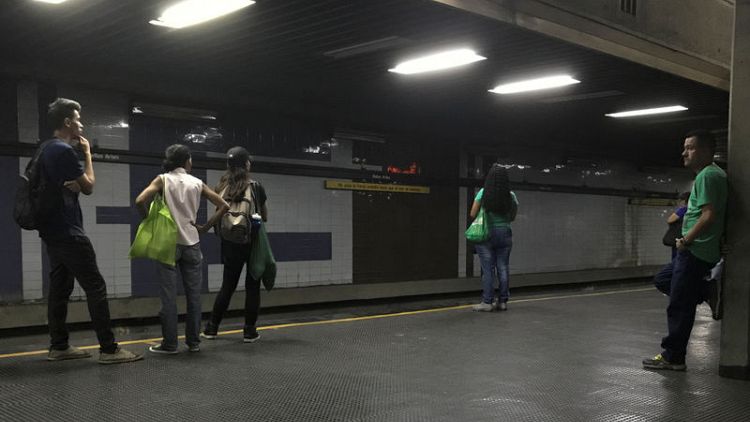By Luc Cohen and Andreina Aponte
CARACAS (Reuters) - Earlier this month, supervisors at the 53 stations in the metro system in Venezuela's capital Caracas received an unprecedented order: once your supply of tickets runs out, unlock the turnstiles and let passengers ride free.
Like most products used by the metro, the raw materials needed to manufacture the tickets are imported, according to three current and former employees of Metro de Caracas C.A., the state-owned company that runs the system.
But the government has not given the company hard currency for imports in more than a year, one source said, a sign of how strict exchange controls, meant to protect shrinking foreign reserves amid an economic crisis, complicate daily life.
Now, machines that once sold tickets read "out of service" and passengers push freely through turnstiles showing green arrows, even as they complain about delays and broken escalators in a system that was once a model for Latin America.
More than 2 million people a day use the metro.
"People are traveling for free because there's no material for tickets," said one of the sources, who all requested anonymity for fear of reprisals.
Neither Venezuela's Information Ministry nor Metro de Caracas responded to requests for comment. Local media quoted Metro president Cesar Vega earlier this month saying the turnstiles were freed "because we are quantifying the number of users per station to decide where to put more staff."
To be sure, the metro was already effectively free before the turnstiles were unlocked in mid-May. Although the crisis has reduced the minimum wage in Venezuela to the equivalent of just a few dollars a month, the fare of 4 bolivars - a fraction of a cent - is minimal for Caracas residents.
"They should at least raise the ticket price to pay for maintenance," said Yorli Correa, a 22-year-old occupational therapist who lives in the Petare slum in eastern Caracas and takes the subway daily to work in the wealthy Chacao district.
"At rush hour at 7 or 8 a.m. and in the afternoon it is a catastrophe."
Metro chief Vega regularly shares pictures of system repairs on social media. But the current and former workers worried a lack of tickets could be a harbinger of more serious problems, such as shortages of imported spare parts.
"Spare parts of damaged trains are used to repair others," said a station supervisor who has worked in the system for more than 20 years. "The number of complaints about delayed trains or lack of air conditioning has increased."
(Reporting by Luc Cohen and Andreina Aponte; Editing by Andrew Cawthorne and Rosalba O'Brien)
